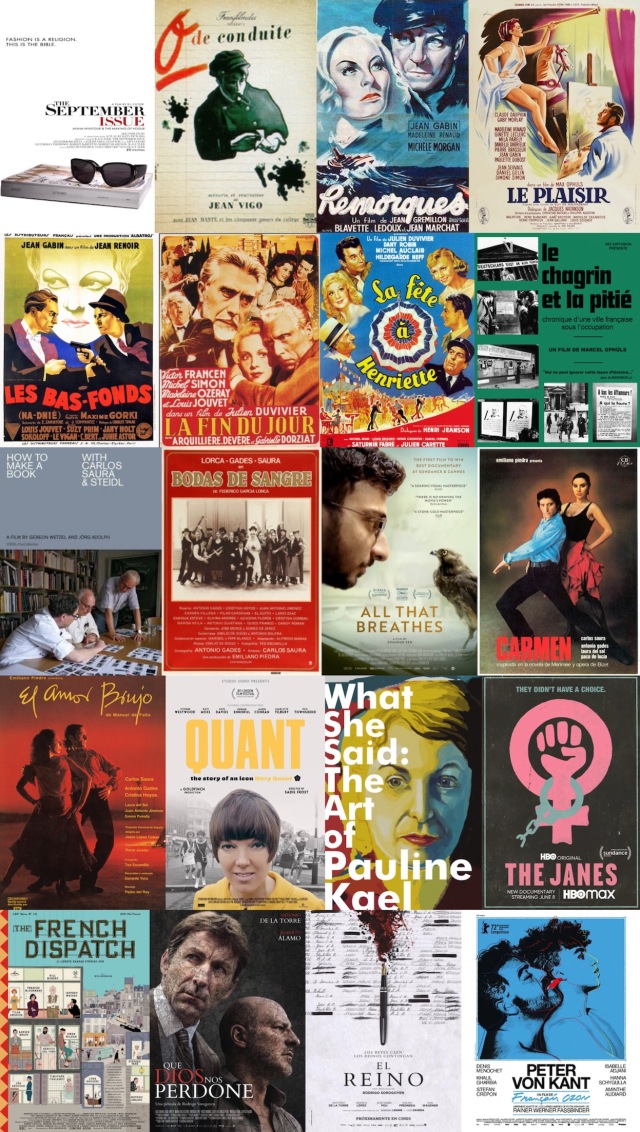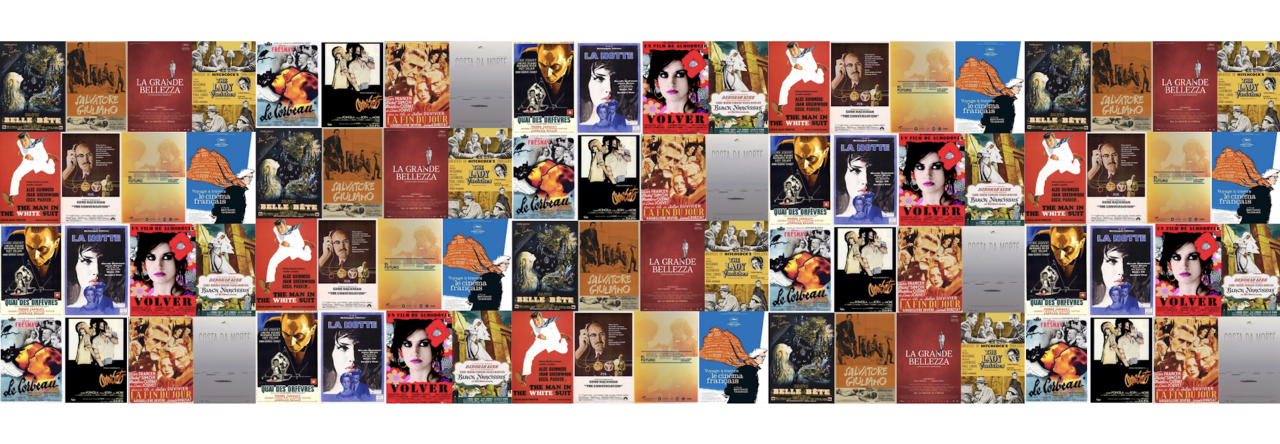
I said in my end-of-year post that I wasn’t sure I’d post anything about what I’ve been watching during the year, but I’ve decided that posting occasionally will allow me to take note of observations while they’re reasonably fresh in my mind, and also hold me accountable to my intention of increasing my viewing habits.
Viewing got off to slow start, but picked up when I settled back in to following in Tavernier’s footsteps once more. I then side-stepped into some Carlos Saura, discovered that Sky Documentaries shows recent titles, and started down a Denis Ménochet rabbit hole (in an admittedly oblique manner for the most part so far).
Of the French films to date in 2023, Remorques (Jean Grémillon, 1941) and La fin du jour (Julien Duvivier, 1939) have been the stand outs. The ‘stormy seas’ of the former refer both to Jean Gabin’s job as a tugboat captain who salvages / rescues boats damaged in storms and the upset caused in his marriage by a woman he rescues (Michele Morgan) on one such mission. The film ends with something in between an incantation and a prayer (a sequence highlighted by Tavernier) that lingers long in the mind. Duvivier’s film takes place in a retirement home for actors (the wonderful Michel Simon among them) with upheaval occurring both in the shape of possible closure (and the residents being dispersed across the country) and the contentious arrival of Raphaël Saint Clair (Louis Jouvet), a star of the stage who seems to have romanced every woman in the home at some point during his career (amusingly the women realise that he recycled his lines) but who was also implicated in the death of another resident’s (Victor Francen) wife. I feel that I may become a Jouvet completist – his character is monstrous and he has a ball with the part.
I also enjoyed the meta discussions about filmmaking in La fête à Henriette (Julien Duvivier, 1952) – wherein the screenwriters of the film we are watching continually rework and brainstorm plot developments and film styles, replaying the action with tweaks until they arrive at something that satisfies both of them. Le chagrin et la pitié / The Sorrow and the Pity (Marcel Ophuls, 1969) is the odd one out in terms of the era of French cinema I’ve mainly been working through, but I went looking for it after thinking about how many of the films I watched last year (and this one) that were made during the war / Occupation or in the near aftermath and yet make no obvious reference to it (understandable in terms of obvious references during the Occupation but even implicit commentary is absent or otherwise extremely controversial [for example, the fallout from Le corbeau (Henri Georges Clouzot, 1943)]). Ophuls draws some jaw-dropping statements out of some of his interviewees, and a sense of unfinished business having been swept under the carpet. In trying to put Ophuls’ film into context (although made for French television, it wasn’t screened until 1981, such was the explosive impact of its dismantling of national myths), I came across this fairly detailed explainer, but didn’t really get any further in contextualising what was going on with cinema, so I may explore that further. [I have already spotted this book].
The death of Carlos Saura prompted me to look at his photography, which in turn led me to watch the Steidl documentary. I then revisited the ‘flamenco trilogy’, watching El amor brujo (Carlos Saura, 1986) for the first time. Antonio Gades is such a charismatic presence, it’s a real shame that he didn’t make more films. I am intending to watch some of Saura’s films that I HAVEN’T watched before (namely fiction films from the 1990s) over the course of the year, and will then hopefully circle back for some sort of summary for the Carlos Saura Challenge, but I won’t be completing the challenge in the same way that it was started.
The Denis Ménochet rabbit hole started because I’m waiting to see As bestas / The Beasts (Rodrigo Sorogoyen, 2022), for which he won the Best Actor award at the Goyas earlier this year. The film is currently on UK release, and I am intending to watch it online via Curzon Home Cinema (once I’ve gotten over the price) because although I’ve pre-ordered the Spanish Blu-ray it only has subtitles in castellano (the film is mainly in Galician and French) – so I will take the opportunity of English subtitles while they’re available (I think my Spanish is currently a bit rusty). Ménochet has a tiny, blink-and-you’ll-miss-him role in The French Dispatch (Wes Anderson, 2021) – he is one of the prison guards in the Benicio del Toro / Léa Seydoux storyline – but watching that film was kind of coincidental to my aim of seeking him out. I had also decided that I should catch up with Sorogoyen because I have several of his prior films, but I don’t think I’m going to follow through on that entirely because the two I’ve watched so far aren’t very motivational.
As much as I will watch Antonio de la Torre and Roberto Álamo in whatever they make (which is how I came to have the DVD), I found Que Dios nos perdone / May God Forgive Us (Rodrigo Sorogoyen, 2016) to be a distinctly mediocre thriller that left a bad taste. Among other things, I have an increasingly low tolerance for murdered female corpses being put on voyeuristic display for the viewer (although, to be honest, if I’d realised the plot was “two mismatched detectives hunt a serial killer who is raping and murdering old ladies in an increasingly violent and unhinged manner as he works through his mother issues”, I’d probably have given it a complete swerve, but such are the occasional pitfalls of buying films on the basis of actors rather than writers/directors), but that is not my only complaint. I currently feel irrationally irritated by how much I disliked the film…I haven’t watched any recent Spanish films in the last couple of years, so I’m annoyed that I restarted with that one. Sorogoyen’s next film – El reino / The Realm, a.k.a. The Candidate (Rodrigo Sorogoyen, 2018) – is an odd one. It’s billed as a political thriller – and it does have those elements – but it also veers into grotesque satire (or, is that social group simply that awful?); I found it tonally strange. The closing moments with Bárbara Lennie’s journalist character puncture the self-satisfaction that oozes through the film (due to the personalities of the other characters) but overall it seemed a bit hollow (again, that could simply be the milieu in which the characters operate – my uncertainty is indicative of my not knowing quite how to read the tone). Unless there’s some sort of step change in quality, I’m starting to think I’ll be disappointed by As bestas, but I will be watching it for Ménochet and Luis Zahera (who has little screen time in El reino but waltzes off with every scene he’s in). [UPDATE 11/04/23: my apprehension was unfounded; I watched As bestas this evening and it’s one of the best films I’ve seen for ages].
The last film for the time being is Peter von Kant (François Ozon, 2022). All I knew going in was that it’s a gender-flipped take on Die bitteren tränen der Petra von Kant / The Bitter Tears of Petra von Kant (Rainer Werner Fassbinder, 1972), which I have seen previously. I found it very effective and affecting – although the film overall is funnier than the original (to me, at least), Ménochet gives a very sincere performance. There is humour in the histrionics, but the emotion is heartfelt. So the rabbit hole will continue, alongside further adventures in French cinema…

Pingback: My 2023: A Year Interrupted – Nobody Knows Anybody